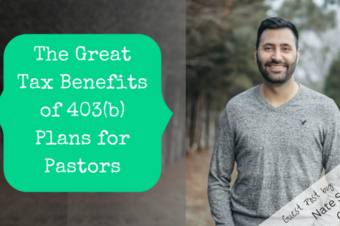
This post breaks down all of the major types of income a pastor can earn and explains how the IRS treats them for Social Security, income tax, retirement plan and payroll tax purposes. It is based on IRS Publication 517.
Have you ever taken the time to read IRS Publication 517, Social Security and Other Information for Members of the Clergy and Religious Workers? Did you get through the whole thing without falling asleep or going cross-eyed?
As a licensed minister, it is dangerous for you not to know what it says. But, it is a tedious piece of literature, to say the least. People complain that taxes are complicated and confusing, but it seems that things are even twice as bad for pastors. You probably know that already, which is how you ended up here.
I spent some quality time in Publication 517 for you, sorting through all of the various tax treatments for the different kinds of income a pastor can earn. Below I will attempt to make things clear and easy to understand in regards to how different kinds of income are treated for different IRS purposes.
I know this doesn’t sound very interesting, but it’s important. You need to know this stuff if you’re a licensed minister. I’ll do my best to make it bearable for you. Let’s go!
Three IRS Areas That Income Affects
There are three different tax-related areas that are affected by income. Different sources of income are treated differently for the following purposes:
Income Tax Purposes
For income taxes purposes, you can be considered a common-law employee or self-employed:
Employees earn wages that are reported on Form W-2. When filing taxes, those wages are reported at the beginning of Form 1040, the individual income tax return. Employees can no longer write-off or deduct unreimbursed business expenses associated with these wages.
Self-employment income is reported on Schedule C. It is calculated by reducing the total income by applicable business expenses to end up with a net amount that is subject to taxes.
Payroll Tax Purposes
The payroll tax has two parts: Social Security and Medicare. The IRS has two systems for collecting payroll taxes, FICA and SECA. Without getting into details, the basic difference is that under FICA the employer pays half of the tax, while under SECA, the worker pays the entire tax.
All pastors pay under SECA by law. This is not optional. Church employees are taxed under FICA unless their church opts out because they “are opposed for religious reasons to the payment of social security and Medicare taxes.” If the church opts out, then its employees pay their payroll taxes under the SECA system.
As a licensed minister, you have the option to opt out of the Social Security and Medicare tax system. If you choose to do so, it only applies to income you earn performing “ministerial services,” not income that you earn in a secular job.
Retirement Plan Purposes
Aside from employer-sponsored retirement plans, the only available tax-advantaged retirement savings vehicles for employees are IRAs, both traditional and Roth.
In addition to IRAs, self-employed people have the ability to establish other kinds of tax-advantaged retirement plans, such as SEP, SIMPLE, and qualified plans, and deduct contributions as business expenses. For more information, see IRS Publication 560.
Types of Income & Their Treatment
Ministerial services, in general, are defined as the services you perform in the exercise of your ministry. These could include sermon preparation, pastoral counseling, running church business meetings, etc.
#1 Income paid by your church for your ministerial services
This is the paycheck you receive from your church for being on staff.
Income Tax: This income is considered employee wages.
Payroll Taxes: Pastors pay under SECA unless they have opted out, in which case they pay nothing. Non-pastor church employees pay under FICA (SECA if your church is exempt).
Retirement Plan: You are considered an employee for retirement plan purposes.
#2 Income paid by others for your ministerial services
This includes money that individuals give you directly for performing weddings, baptisms or other personal ministry-related services.
Income Tax: This is considered self-employment income and calculated on Schedule C.
Payroll Taxes: Not applicable if you are exempt. Otherwise, you pay under SECA.
Retirement Plan: You are considered self-employed and qualified to establish a small business retirement plan.
#3 Income earned as an employee from non-ministerial services
This would be any income you earn from a secular job where you work for someone else.
Income Tax: This income is considered employee wages.
Payroll Taxes: Subject to Social Security, even if you have a ministerial exemption. Paid under FICA.
Retirement Plan: You are considered an employee for retirement plan purposes.
#4 Income earned as a self-employed person from non-ministerial services
This would be any income you earn from side gigs, your own business or as a contractor or freelancer.
Income Tax: This is considered self-employment income and calculated on Schedule C.
Payroll Taxes: Subject to Social Security, even if you have a ministerial exemption. Paid under SECA.
Retirement Plan: You are considered self-employed and qualified to establish a small business retirement plan.
#5 Other kinds of income
Royalties from books, songs, etc.
Religious books are considered to be a part of your ministerial duties and fall under category #1 income. Songs written for congregational worship are seen in the same way.
Gifts & Love Offerings (Birthday, Christmas)
- If they come from the church, they are taxable income and fall under category #1.
- If they come from an individual as a result of a ministerial duty you performed (counseling, preaching, etc.), they are taxable income and fall under category #2.
- If they are from an individual and not related to a ministerial duty you performed, they are tax-free.
Reimbursements For Employee Expenses
How these are treated depends on whether or not your employer has an accountable plan.
Accountable Plan: These are not reported on Form W-2 and are not taxable. The rules state that your expenses must have a business connection—that is, you must have paid or incurred deductible expenses while performing services as an employee of your employer. You must adequately account to your employer for these expenses within a reasonable period of time and you must return any excess reimbursement or allowance within a reasonable period of time.
Non-accountable Plan: Any reimbursements made outside of an accountable plan are reported on form W-2 as wages and are taxable.
Housing Allowance
The housing allowance must be an officially designated, specific amount. It is not considered income for income tax purposes. However, it is considered income when calculating self-employment taxes for those who are not exempt.
There you have it. A bunch of different kinds of income that you, a pastor, can have, and how the IRS treats each one. I hope this has helped clarify things for you. If you have any further questions, let me know if the comments!




30 Responses
Ana
January 10, 2019Thank you for this! If the church as an employer, has a SIMPLE IRA, is the housing allowance considered salary?
Amy
January 13, 2019Ana, according to the Internal Revenue Code Section 107, the housing allowance is not considered gross income. It looks like the housing allowance does not count as compensation when calculating retirement plan contributions. You may want to double check with the IRS just to be sure, though.
Anne
March 10, 2020Would excess housing allowance (that is taxable) be considered qualified income in calculating an allowable roth ira contribution?
Amy
March 11, 2020Yes, it would. It counts as your normal earned income.
DeacN
June 29, 2020I am on the board of a religious non-profit org. I also function as the non-profit’s chaplain in charge of it’s ministry and religious functions. I am an ordained deacon and serve in the non-profit’s sister church in a liturgical and ministerial function. The non-profit wants to begin providing a housing allowance, my question is, are they able to do this? I work a secular job in the police department and don’t receive a stipend from the church. Thank you in advance.
Amy
July 1, 2020Deacn,
Chaplains are usually eligible for the housing allowance. I’m not familiar with your church’s leadership positions, so I cannot tell you if in ordained deacon would qualify as a minister for IRS purposes. This article goes into more detail about who is eligible for the housing allowance: https://pastorswallet.com/who-is-eligible-for-the-clergy-housing-allowance/ You could also ask your church’s leadership if others in your position have been deemed eligible by the IRS.
Kate
April 26, 2021Another form of income….what if you rent out a room in your house? What if you have a room you rent out but it is detached from the house? How do you manage this? And how does depreciation work?
Amy
April 27, 2021Kate, that would fall under #4 above, as a non-ministry side business. This article explains depreciation: https://www.investopedia.com/articles/investing/060815/how-rental-property-depreciation-works.asp This article explains tax issues when renting a room in your house: https://www.nolo.com/legal-encyclopedia/tax-issues-when-renting-out-room-your-house.html#:~:text=You%20can%20fully%20deduct%20(or,(such%20as%20a%20bed). And this article explains how that affects the housing allowance: https://pastorswallet.com/how-hosting-through-airbnb-affects-your-ministerial-housing-allowance/
Pamela R Edwards
May 28, 2021Thank you so much for taking the time to explain this. We have been very confused about this and are still unsure as to what to do tax wise. We are a small church 15-30 people, and we do not have any paid employees. Question: If the church pays our bills ie house payment or car note, does this fall under housing allowance? And, should we claim on taxes? We do not receive a salary.
Amy
June 1, 2021If your church pays your bills, that would be considered compensation. Housing costs would qualify for the housing allowance, so you wouldn’t have to pay federal income taxes but you would have to pay self-employment taxes (if you haven’t opted out of Social Security). A car payment would not qualify for the housing allowance, so anything the church paid would be taxable income to you.
Adam
June 14, 2021What about being paid for a coaching/mentoring program? The organization I’m associated with is a 501c3 and I’m opted out.
Adam
June 14, 2021What about being paid for pastoral coaching? The organization I’m associated with is a 501c3 and I’m opted out.
Amy
June 15, 2021Adam, that would depend on if you are a W-2 employee or a 1099 contractor. Also, is your work considered “ministerial services?” Another way to look at it is, do you have to be a pastor to do the work? If so, then it is treated as pastoral income and either self-employment or employee income depending on your relationship to the organization.
Emma
October 22, 2021I am an ordained minister and part of my compensation plan agreed upon in June 2021 was to move half of my pay to a housing allowance amount. My paychecks did not change in any way after the housing allowance was approved however. I still see the same pay amount and same taxes taken out. Should my checks look differently or should they be processing them differently in some way? It seems there would be tax ramifications if they are still withholding taxes from the full amount… or perhaps it is just my responsibility to report it to my CPA at the end of the year? They have asked me to figure out if they need to do something differently lol. Thoughts? TIA
Amy
October 25, 2021Emma, the big question is whether they are reporting the full income to the IRS as taxable income. It sounds like they might be. Have them double check the forms they are filing with the IRS. They should only be reporting the non-housing allowance portion of your income to the IRS. The housing allowance portion you report when you file Schedule SE if you haven’t opted out. If you’ve opted out, then it is not reported to the IRS. It is possible that they would withhold the same amount in taxes, but not probable. If they were to continue withholding the same amount even though your taxable income was cut in half, then you are likely overpaying taxes significantly. You could have them consult with Denisse from Ascend Business Management to help them set things up properly: https://ascendbm.com/
Anthony
April 5, 2022My W-2 shows wages in box 1, and zero in box 3 and 5 (social security). The the wage in box 1 eligible in the IRA contribution calculation. Or not eligible because it was not included in the box 3 and 5 social security and Medicare calculation?
Amy
April 8, 2022Anthony, your eligibility to contribute to an IRA is based on the income shown in Box 1. It was not reported in boxes 3 and 5 because as a minister you are a dual-status taxpayer and have to pay Social Security and Medicare taxes as if you were self-employed using Schedule SE.
Hans Weston
August 30, 2022Amy,
Can you clarify your statement on housing allownance? It appears from the IRS site that we do need to pay Social Security on housing allowance even though it is not “taxable income”. Just trying to get everything in order.
sal
November 14, 2023Hi In New York there is a program called SNAP( food assistance). One is only elgible if meet elgibilty standards. I wanted to know if parsonage money is not counted to that income . especially if opted out and so not paying any taxes?
Amy
November 19, 2023Sal, unfortunately I haven’t been able to determine if SNAP counts parsonage money as income. If they get your income from your Form 1040, they wouldn’t, but if they just ask for total income or compensation, it would count.
Sonya
March 16, 2024I love your blog- thank you for the specific and relevant info!
My husband and I are pastors with housing allowances and we have a net operating loss from non-church self-employed side gigs. Can those schedule C net losses offset the self-employment income from our housing allowance, Would this reduce our overall self- employment tax liability?
Amy
March 18, 2024Sonya, I do not believe you can lower your self-employment taxes for your ministerial income in that way, though I am not completely sure so you should consult a CPA.
Amber
April 4, 2025Thank you for this info! Every year I get confused when working through our taxes with tax software…my husband is a pastor, his W2s show his wages, and federal income tax is withheld, and social security tax and Medicare tax is withheld as well. So in the tax filing program, I enter all that, and then it asks if anyone is a member of the clergy and I have to enter his wages again, and I watch the refund amount go down dramatically. So am I paying taxes twice? Overpaying? Is the church perhaps paying/filing wrong? I can never get past the confusion! Would love any insight you might have! Thanks!
Amy
April 13, 2025If the church is withholding Social Security and Medicare taxes on ministerial income, then they are doing it incorrectly. You will probably want to work with a professional to get that cleared up and make sure you’re not double-paying the Social Security and Medicare taxes. What you’re seeing when you say your husband is clergy is the tax software charging 15.3% Social Security and Medicare taxes on all of his clergy income. If the church has already withheld those taxes, you could be double-charged. You can find a tax professional who understands clergy taxation here: https://pastorswallet.com/clergy-tax-preparers/
ES
April 18, 2025Are Social Security taxes paid only on housing allowance or on regular income as well? I’m confused because my tax preparer, who says she works on clergy taxes, told me that SS taxes are only paid on housing allowance.
Amy
April 21, 2025Social Security taxes are paid on all income. For most employees, they are taken out of their paycheck on a regular basis through FICA, so they don’t show up on your tax return. As a minister, your employer should NOT be withholding them and you should be calculating them on Schedule SE with your tax return. It sounds like your tax preparer does not understand clergy taxes or is not explaining things clearly.
Vanessa Harper
April 21, 2025My pastor does not receive a salary, but the Church Board voted to give him a housing allowance. Since he does not receive any wages, my understanding is that the church is not responsible for reporting the housing allowance. Please correct me if I am wrong. But also, should the love offerings the pastor receives on a regular basis be reported as wages on W2 or can they be reported on 1099-Misc since he is not actually paid any wages?
Amy
April 21, 2025Because your pastor is an employee, he should be paid W-2, not 1099. As for housing allowance, the IRS prefers to have it reported in Box 14 of the W-2, but it is not required. The church does not have to report it to the IRS though they have to provide the pastor with the amount paid at the end of the year so that the pastor can pay Social Security and Medicare taxes (if not opted out) on it. The love offerings can also be designated as housing allowance or paid as taxable income (on W-2).
Jess
May 6, 2025Hello, my husband will be receiving about $1000 a month to go towards a retirement plan. Is that taxable and does it count towards your income to purchase health insurance through the marketplace? Thanks!
Amy
May 24, 2025If it goes directly into a pre-tax employer-sponsored retirement plan, then it will not be taxable or show up as income for purchasing health insurance. If he receives it as pay, then it is taxable income but can be deducted from income if contributed to a traditional IRA. In that instance, it also would not count towards income for health insurance.